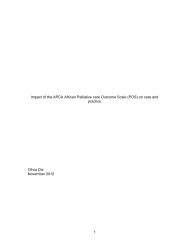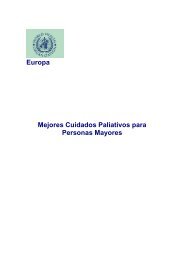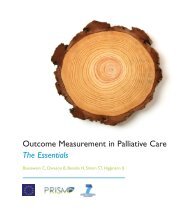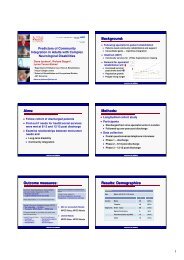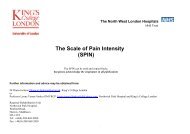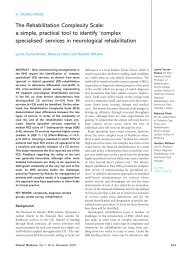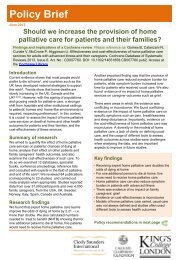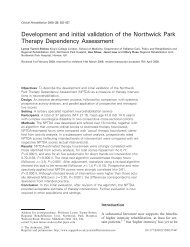2004 - 2007 - Cicely Saunders Institute - King's College London
2004 - 2007 - Cicely Saunders Institute - King's College London
2004 - 2007 - Cicely Saunders Institute - King's College London
Create successful ePaper yourself
Turn your PDF publications into a flip-book with our unique Google optimized e-Paper software.
1<br />
Highlights<br />
<strong>2007</strong> is the 10-year anniversary of the founding of<br />
the Department of Palliative Care and Policy, which<br />
has grown in that time from a department comprising<br />
Professor Irene Higginson and two researchers (both on<br />
grant funding) to a large, multi-professional department<br />
with well over 40 staff, plus many honorary and visiting<br />
appointments. Although very saddened by the loss of<br />
Dame <strong>Cicely</strong> <strong>Saunders</strong> in July 2005 we have continued<br />
to drive forward her vision, through research, education,<br />
care and, importantly, the plans to develop an institute<br />
in her name.<br />
Our research is mainly applied and translational<br />
– concerned with discovering solutions to improve the<br />
care, symptom management and support for those<br />
affected by life threatening, progressive or profoundly<br />
disabling conditions. In this regard, palliative care and<br />
rehabilitation have much in common. Both specialities<br />
seek to add quality of life to the time available (whether<br />
in living with a disability or in dying), rather than finding<br />
a ‘cure to a disease’. They seek to cure or reduce the<br />
effects of symptoms, promote dignity and social and<br />
emotional support. Both involve complex ‘interventions’<br />
from a multidisciplinary team of professionals, and the<br />
success of that intervention must usually be judged on<br />
a background of deterioration in the person’s condition.<br />
Thus, the two fields face similar research challenges.<br />
This is reflected in our research activity where there is<br />
the potential to learn from each other, and from other<br />
fields, in the measurement of outcomes, in the design<br />
of evaluations of complex interventions and in the future<br />
in seeking potential solutions to symptoms, methods<br />
and ways to promote dignity and support for carers. As<br />
the remit of palliative care extends beyond cancer to<br />
include people with other long term conditions, there is<br />
an interface to be explored between rehabilitation and<br />
palliative care services to support people who live their<br />
lives with complex disability.<br />
what factors influence whether people are able to<br />
be cared for at home and to die at home, making an<br />
important contribution to end of life strategies in many<br />
countries. We have evolved several new strands of<br />
research, particularly on palliative care in Africa, the<br />
costs and benefits of rehabilitation, and improving<br />
palliative care for older people. During the period of the<br />
report, we have seen 53 MSc, Diploma and Certificate<br />
students graduate, along with 3 successful PhD awards,<br />
while continuing to evolve our undergraduate education<br />
programme.<br />
The following pages outline our research activity across<br />
four main strands - evaluating and improving care;<br />
symptom led research; measuring outcomes; and living<br />
and dying in society. It outlines our influences on policy<br />
and guidelines, educational and clinical activities, and<br />
the plans for the new <strong>Institute</strong> of Palliative Care. Shortly<br />
before her death, Dame <strong>Cicely</strong> <strong>Saunders</strong> was delighted<br />
to see plans for her brainchild developing – to create<br />
the world’s first purpose built <strong>Institute</strong> of Palliative<br />
Care. At the end of the report we list publications,<br />
keynote lectures and supporters, along with a full list of<br />
staff. We are grateful to a wide range of collaborators<br />
and colleagues with whom we work in research,<br />
teaching, care and policy. Special thanks go to those<br />
organisations, statutory and charitable, and individuals<br />
that support our activities. In a climate where in the<br />
UK less than 0.2% of the research spend in cancer<br />
goes to palliative and end of life care, with probably<br />
a lower proportion than this being allocated in noncancer<br />
conditions, their leadership has been vital to our<br />
continued work.<br />
In the period of this report, <strong>2004</strong>/5 to 2006/7, our<br />
research, teaching and policy development have<br />
advanced considerably locally, nationally and<br />
internationally. We have seen the fuller integration of<br />
palliative care and rehabilitation, especially as work<br />
in palliative care grows to consider those people with<br />
longer illness trajectories, with cancer, non-cancer<br />
and multiple conditions. Our results have underpinned<br />
some of the most significant national and international<br />
guidance, including from the National <strong>Institute</strong> of<br />
Clinical Excellence (NICE) in the UK, the State of the<br />
Science Report on End of Life Care in the USA, the UK<br />
Government White Paper on Our Health Our Choice<br />
Our Lives, the House of Commons Health Committee<br />
Report on End of Life Care and several National Service<br />
Frameworks, including that on Long Term Neurological<br />
Conditions in which Professor Lynne Turner-Stokes and<br />
her team played a substantial role.<br />
We have tested and discovered new means to improve<br />
the management of symptoms, such as breathlessness<br />
and spasticity, and have trialled new services for people<br />
with conditions beyond cancer. We have discovered<br />
2



